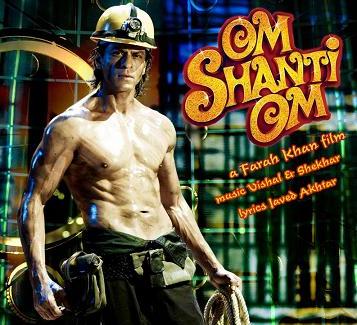
 |
 Farah Khan’s second film is not as cohesive as her directorial debut – ‘Main Hoon Na’ even though it’s still a warm and flamboyant homage to the films of her youth. ‘Om Shanti Om’ doesn’t take itself seriously; there are no hidden meanings – only a clear purpose – to entertain. Without doubt, there is much to enjoy but taken as a whole, one crucial element is missing and that’s romance. Farah Khan’s second film is not as cohesive as her directorial debut – ‘Main Hoon Na’ even though it’s still a warm and flamboyant homage to the films of her youth. ‘Om Shanti Om’ doesn’t take itself seriously; there are no hidden meanings – only a clear purpose – to entertain. Without doubt, there is much to enjoy but taken as a whole, one crucial element is missing and that’s romance.
The story built around the theme of reincarnation is about the lives of two men – Om Makhija – a charming junior artiste of the 70s and Om Kapoor – an arrogant present day superstar (both played by Shah Rukh Khan). Om Makhija’s filmi escapades are delightful and reminiscent of the Hollywood classic “Singing In The Rain” (1952). The over-the-top red carpet display on premiere night, spoofs of hammy acting styles, the difference in status of the actor-lovers, the prominence of billboards as the focus of adulation and a love song (Main Agar Kahoon) set in an old-time film studio – all point to Farah Khan paying homage to at least one Hollywood film even though she naughtily identifies her villain (Arjun Rampal) with Hollywood. There is acknowledgement from the outset that Subhash Ghai’s Karz (1980) and Mushir Riaz’s Mehbooba (1976) are also being channelled for their reincarnation themes. The love between Om Makhija and beautiful leading actress Shanti (Deepika Padukone) is adequately established so that the dramatic events which transpire manage to strike the necessary chord. Where Farah Khan fails as a director is keeping the “love alive” in what is essentially another story post-intermission. This is not to say that the film plummets after the break – it doesn’t. The character of Om Kapoor is initially very entertaining. It’s a send up of superstar conceit with lots of self-deprecating digs at Shah Rukh Khan’s own superstardom. His well-documented lateness, his debut in "Deewana" (1992), product endorsements, half-hearted waves to adoring fans, and repetitive Raj-Rahul roles are all part of the fun. The same sense of exuberance is part of the problem. Farah Khan becomes so caught up in her big production numbers and wonderful little asides that the thread of her narrative which is already quite thin – snaps altogether even though it’s a while before the realization dawns; we’re too busy enjoying ourselves to notice until the denouement kicks in. The way the past impacts on Om’s present isn’t drawn out carefully enough to imprint the memory of that first romance on Kapoor’s subconscious. Its texture and melancholy are not developed by subsequent musical numbers. I enjoyed ‘Dard-E-Disco’ but apart from displaying Shah Rukh’s six-pack – it did little to advance the story. ‘Deewangi Deewangi ’ - with its 31 stars, is a nice tribute to Desai’s ‘John, Jani, Janardhan’ from Naseeb (1981) but again, apart from giving us a terrific party it contributes little to the narrative. Maybe in this film, the parts matter more than the whole but why the incredibly drawn-out and dreary denouement? The Kapoor character goes through an unconvincing change of character where it’s clear that both the actor and director enjoyed doing the super-brat scenes so much more and the ending seems like a lifeless add-on.
The post-intermission half is essentially straight-out spoof of the sort that Jha’s “King of Bollywood” (2004) did so well. A send up of nepotism, expedient filmmaking, stardom, award ceremonies overwhelm the homage aspect which is relegated to second place. In ‘Main Hoon Na’ – the masala balance was more satisfactory because the bonding of the characters was sustained and the line between send-up and “filmi reality” was clearly drawn. For this reason Farah Khan’s first had more “cross-over” potential. Although Westerners didn’t get a lot of the digs at Bollywood itself, the characters in ‘Main Hoon Na’ were more whole and interactions between them were more interesting. Those who know little about Bollywood films would probably regard ‘Om Shanti Om’ as a rather weak film because it confirms the worst Western stereotypes of Bollywood and because too much of the humor is in-house. Where the performances are concerned, Arjun Rampal does a fine villain and Shah Rukh Khan reprises his multiple masala performances with the addition of a fresh slightly villainous comedic angle in the super-brat. I applaud Farah Khan for being successful in a “man’s world”. Her sense of humor and fun are great assets but need to be reigned in a tad for a tighter – more consistent end product.
|
|||||||||||||||||||||
| Comments | Contact Us | Advertise | Terms of Service | Privacy Policy |